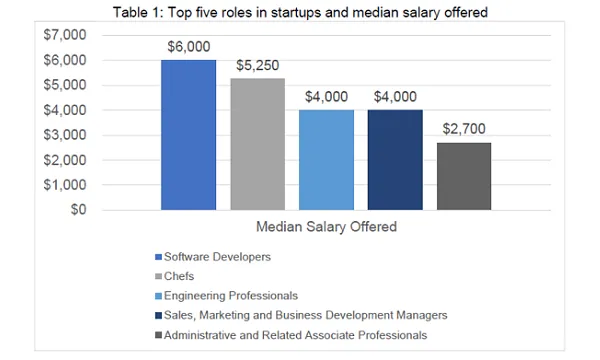
Startups under SGUnited Jobs and Skills provided 4,600 jobs: MOM
Salaries are also assured to be in line with the industry norm.
Over 1,600 startups have come on-board the SGUnited Jobs and Skills programmes, which have opened up more than 4,600 jobs and 860 traineeships or attachments to local jobseekers, according to the Ministry of Manpower (MOM).
Jobs offered include a variety of unconventional roles such as gallery manager executive, commercial intelligence associate and animator; tech-related roles such as software developers and app developers, and non-tech roles like sous chefs, business development leads and digital content producers.
MOM assured that salaries offered by the startups are not below the industry norm. For instance, the median salary offered for software developers is $6,000, which is in line with the industry standard.
Companies hosting SGUnited Traineeships have started to take in trainees in June. About 150 fresh and recent graduates have since entered the startup scene through the SGUnited Traineeships Programme.
Meanwhile, MOM shared that NTUC’s Employment and Employability Institute (e2i) has organised 22 outreach and engagement activities across Singapore, reaching more than 2,800 jobseekers in July. These events, which are on top of the WSG outreach events, include SGUnited Job Interviews for roles in areas such as healthcare, community care, technology, as well as virtual career workshops on topics such as salary negotiations, practical job search tips and networking skills.
NTUC’s e2i and WSG have reached more than 16,000 job seekers in July.
MOM further stated that as at end-July, about 6,300 employers have submitted notifications on their cost-saving measures to the ministry, affecting around 224,800 employees. About half of affected workers are from three sectors–accommodation and food services, construction, wholesale and retail trade.

However, the volume of these notifications fell during the Circuit Breaker period. Between April and June, the number of employers submitting notifications exceeded March even if the number of new workers affected moderated sharply from May. This suggests that companies were making concerted efforts to hold back retrenchments, likely encouraged by the broad-based support measures provided by the Government, MOM said.

The top three cost-saving measures implemented were adjustments to monthly salary components, no-pay leave and (iii) shorter work week. Local employees make up slightly less than half of all employees affected by cost-saving measures.


![SBR 5 Lorem Ipsum News 2 [8 May]](https://cmg-qa.s3.ap-southeast-1.amazonaws.com/s3fs-public/styles/exclusive_featured_article/public/2025-05/a_hand_pointing_to_a_futuristic_technology_5b87c9d0e3_3.png.webp?itok=M3Hf-9XR)
![SBR 4 Lorem Ipsum [8 May Top Stories]](https://cmg-qa.s3.ap-southeast-1.amazonaws.com/s3fs-public/styles/exclusive_featured_article/public/2025-05/a_hand_pointing_to_a_futuristic_technology_5b87c9d0e3_2.png.webp?itok=2m5Wl0MX)


![Exclusive three SBR 12 Lorem Ipsum [8 May]](https://cmg-qa.s3.ap-southeast-1.amazonaws.com/s3fs-public/styles/exclusive_featured_article/public/2025-05/a_hand_pointing_to_a_futuristic_technology_5b87c9d0e3_11.png.webp?itok=8kn_UIfA)
![SBR 3 Lorem Ipsum [ Exclusive 2]](https://cmg-qa.s3.ap-southeast-1.amazonaws.com/s3fs-public/styles/exclusive_featured_article/public/2025-05/a_hand_pointing_to_a_futuristic_technology_5b87c9d0e3_1.png.webp?itok=YCyjLegJ)
![SBR 2 Lorem Ipsum [8 May]](https://cmg-qa.s3.ap-southeast-1.amazonaws.com/s3fs-public/styles/exclusive_featured_article/public/2025-05/a_hand_pointing_to_a_futuristic_technology_5b87c9d0e3_0.png.webp?itok=_cKD-29o)

![Video [Event News]](https://cmg-qa.s3.ap-southeast-1.amazonaws.com/s3fs-public/styles/event_news_featured_article/public/2025-05/screenshot-2025-05-08-at-4.58.53-pm_0.png.webp?itok=Kud35sMs)
![Event News SBR 9 Lorem Ipsum [8 may]](https://cmg-qa.s3.ap-southeast-1.amazonaws.com/s3fs-public/styles/event_news_thumbnail/public/2025-05/a_hand_pointing_to_a_futuristic_technology_5b87c9d0e3_8.png.webp?itok=DTh_dbYp)
![Event News SBR 9 Lorem Ipsum [8 May]](https://cmg-qa.s3.ap-southeast-1.amazonaws.com/s3fs-public/styles/event_news_thumbnail/public/2025-05/a_hand_pointing_to_a_futuristic_technology_5b87c9d0e3_7.png.webp?itok=vzDAzb6V)
![Event News SBR 8 Lorem Ipsum [8 May]](https://cmg-qa.s3.ap-southeast-1.amazonaws.com/s3fs-public/styles/event_news_thumbnail/public/2025-05/a_hand_pointing_to_a_futuristic_technology_5b87c9d0e3_6.png.webp?itok=jvHFc4P6)
![Video [Event News]](https://cmg-qa.s3.ap-southeast-1.amazonaws.com/s3fs-public/styles/video_thumbnail/public/2025-05/screenshot-2025-05-08-at-4.58.53-pm_0.png.webp?itok=yZnI0YBb)
![Video 1 SBR [8 May]](https://cmg-qa.s3.ap-southeast-1.amazonaws.com/s3fs-public/styles/video_thumbnail/public/2025-05/screenshot-2025-05-08-at-4.58.53-pm.png.webp?itok=9AAeRz_k)

 Advertise
Advertise

